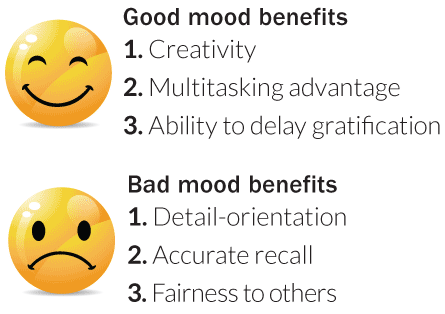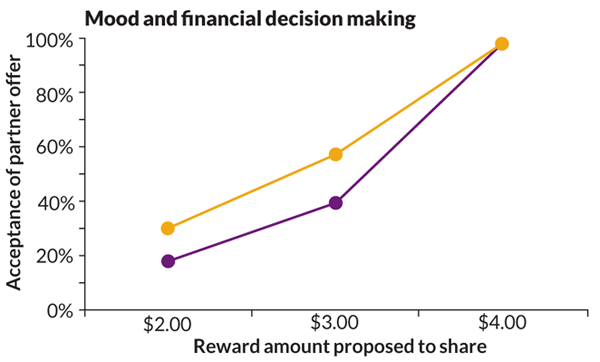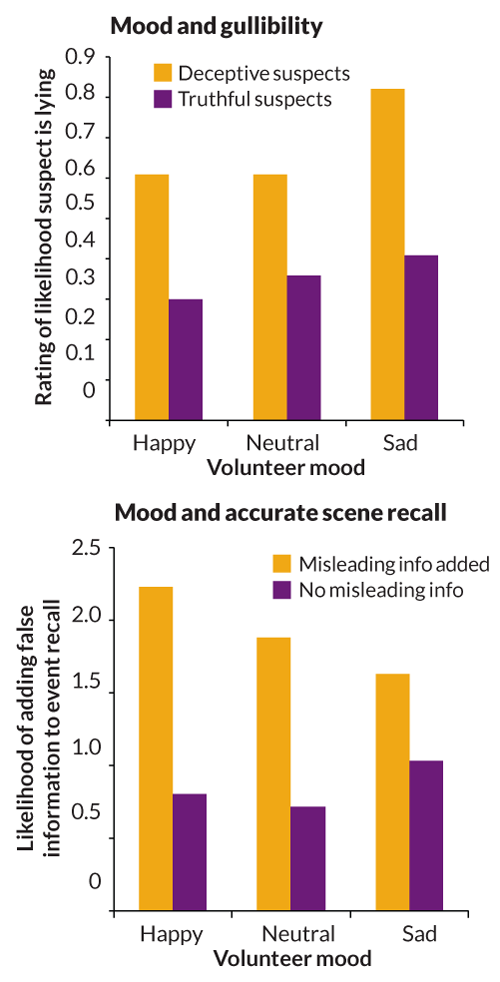The bright side of sadness
Bad moods can have unappreciated mental upsides

Evidence suggests that gloomy moods improve key types of thinking and behavior.
Vertes Edmond Mihai/Shutterstock
Thomas Jefferson defended the right to pursue happiness in the Declaration of Independence. But that’s so 237 years ago. Many modern societies champion everyone’s right to be happy pretty much all the time.
Good luck with that, says psychologist Joseph Forgas of the University of New South Wales in Sydney. A lack of close friends, unfulfilled financial dreams and other harsh realities leave many people feeling lonely and forlorn a lot of the time. But there’s a mental and social upside to occasional downers that often goes unappreciated.
“Bad moods are seen in our happiness-focused culture as representing a problem, but we need to be aware that temporary, mild negative feelings have important benefits,”
Forgas says.
Growing evidence suggests that gloomy moods improve key types of thinking and behavior, Forgas asserts in a new review paper aptly titled “Don’t worry, be sad!” For good evolutionary reasons, positive and negative moods subtly recruit thinking styles suited to either benign or troubling situations, he says. Each way of dealing with current circumstances generally works well, if imperfectly.
New and recent studies described by Forgas in the June Current Directions in Psychological Science illustrate some of the ways in which periods of sadness spontaneously recruit a detail-oriented, analytical thinking style. Morose moods have evolved as early-warning signs of problematic or dangerous situations that demand close attention, these reports suggest.

One investigation found that people in sad moods have an advantage remembering the details of unusual incidents that they have witnessed. And a little gloominess could help job applicants; lousy moods cut down on the tendency to stereotype others, thus boosting the accuracy of first impressions. People in sad moods also show a greater willingness to work on demanding tasks, communicate more persuasively and are more concerned with being fair to others than are peers in neutral or happy moods.
Alternatively, good moods trigger a loose mode of thought conducive to creativity and seeing the big picture. Happiness signals that a situation is safe, or at least not immediately threatening, Forgas suggests. As a result, people in a cheery state have the luxury of focusing on themselves rather than on their environments.
Whether good or bad, moods are relatively low-intensity, background feelings that can last for anywhere from a few minutes to the whole day. A person may feel somewhat good or bad, happy or sad, without knowing why or even being aware of such moods. Sad moods fall far short of clinical depression’s constant feelings of helplessness and hopelessness. But moods linger much longer than emotions, which typically flare up and burn out fairly quickly. In contrast to a mood, joy, anger and disgust feel intense and are experienced as having definite causes.
Feelings as information
Like Forgas, psychologist Norbert Schwarz of the University of Michigan in Ann Arbor sees mental value in sadness. “It’s shallow and untrue to assume that positive feelings can only have positive consequences and negative feelings can only have negative consequences,” he says.
When Schwarz was a graduate student in the late 1970s, an influential line of research held that happy moods make people more likely to remember positive events and sad moods more often revive memories of negative events. That account of how feelings influence thought seemed incomplete to the aspiring psychologist. On “good” days, he reasoned, everything just felt right without any past triumphs coming to mind. On “bad” days, life felt lousy in the moment, without any tragic memories returning for an encore.
Schwarz launched a series of studies indicating that people use low-intensity moods as a source of information when forming judgments. Good and bad moods are usually experienced as being about whatever problem or situation a person currently faces, he and his colleagues found. Treating moods in this way often works out, as when a supervisor recommends someone for a raise based on feeling good about that person’s recent job performance. Feelings can mislead if, say, a boss feels happy because it’s a sunny Friday and thus approves a raise for someone who pleads for a salary hike but doesn’t deserve it.
By 1990, Schwarz and his colleagues had conducted a few studies suggesting that positive and negative moods spontaneously shape how people think. Sad moods fostered attention to details, they discovered, whereas happy moods promoted playfulness and creativity. More work was needed, though, to confirm those results and explore their implications for making decisions in various situations.
Individuals aren’t slaves to their moods, Schwarz cautions. A sad person can think outside the box if necessary, say, to solve problems at work. And a happy person can accurately fill out tax forms or complete other detail-heavy tasks.
Evidence from many labs supports Schwarz’s view that moods inform people’s judgments, often advantageously and outside of awareness, psychologist Rainer Greifeneder of the University of Basel in Switzerland and his colleagues reported in the May 2011 Personality and Social Psychology Review.
Moods provide surprisingly keen insights into one’s environment, the team concluded. Provocative support for that idea appeared in the October 2012 Journal of Consumer Research. A team led by business professor Michel Tuan Pham of Columbia University in New York City found that volunteers who trusted their feelings did better at predicting events such as how the stock market would perform in the next week and how upcoming movies would fare at the box office than volunteers who mistrusted their feelings.
By embracing their moods, superior forecasters gained unconscious access to a vast amount of learned information that informed their predictions, Pham speculated.
“In natural situations, feelings provide mostly valid information about whether there is a problem or not and how to respond to current tasks,” Schwarz says.
Power of sad

Forgas sees no need for a special field of research to study “negative psychology.” He would settle for “more awareness that negative feelings are so common and widespread that they must have adaptive functions.” Reports of specific ways in which sadness benefits thinking are beginning to accumulate.
Consider memory. In the January 2009 Journal of Experimental Social Psychology, Forgas and his colleagues found that shoppers in a suburban store remembered more details about what they saw in the store when they reported being in bad moods on rainy, cold days than when they felt happy on sunny, warm days.
Sad moods also improve eyewitness memory, apparently by lowering the tendency to incorporate false and misleading details into accounts of what was observed. In a 2005 study in the Journal of Experimental Social Psychology, college students witnessed a staged altercation between a lecturer and a woman who angrily interrupted the talk.
One week later, while in happy or sad moods induced by watching emotional film clips, participants read questions about the incident that included misleading information. Those in sad moods remembered what had happened much more accurately than their happy peers, Forgas and his colleagues reported. Fewer pieces of false information twisted the memories of sad students.
Sad moods can also make first impressions of others more reliable, Forgas says. People often judge those that they meet for the first time by assuming that obvious but often irrelevant traits, such as physical attractiveness, reflect intelligence, agreeableness and other as yet unknown traits. Psychologists refer to this much-studied phenomenon as the halo effect.
Negative moods topple the halo effect off its cockeyed perch, Forgas reported in the December 2011 European Journal of Social Psychology. After reminiscing about happy, sad or neutral personal experiences, volunteers read a one-page philosophical essay. Forgas attached a photograph of the writer to each copy of the essay, showing either a casually dressed young woman or a middle-aged man wearing a suit and glasses.
Happy participants rated the essay far more positively when they thought it was written by the academic-looking man. This halo effect largely disappeared among sad participants. Those in a neutral mood preferred the man’s essay, but not to the extent that happy volunteers did.
Sad folks took longer to read and rate the essays than happy and neutral participants did. That’s probably because feeling sad fostered a more careful appraisal of essays and photos, Forgas suggests. As a result, he proposes, sad volunteers largely rejected the stereotype of philosophers as tweedy, professorial men, helping to minimize the halo effect.
Cheerless cooperators
Sadness also confers some surprising social benefits. “While a positive mood may increase self-focus and selfishness, a negative mood can increase concern for others and the quality of communication,” Forgas says.
Interview
Norbert Schwarz, a psychologist at the University of Michigan in Ann Arbor, is one of the pioneers in studying how happy and sad moods inform people about their current situation and influence their thinking styles. “We experience our moods as being real and we use them as real information,” Schwarz told staff writer Bruce Bower in an interview. “Even someone like me who studies that stuff falls prey to their own moods.”
When asked to divide raffle tickets or other prizes with a partner shown in a photo on a computer screen, sad volunteers handed out nearly even portions while happy volunteers kept the bulk for themselves, Forgas and a colleague reported in the January Computers in Human Behavior.
In another computer game, participants were informed that a partner seen only in a photo could accept or reject offers of how to divvy up prizes. No partner actually existed, but players were told that a vetoed offer would leave them empty-handed.
Again, sad volunteers shared valuables more evenly than their happy cohorts did. Sad players took longer to reach their decisions, consistent with having thought more carefully about how to make fair offers.
A gloomy mood also increased participants’ concern with fairness when the tables were turned and they had to evaluate offers from a player who didn’t really exist. Relative to the happy crowd, a substantially greater proportion of sad volunteers rejected unfair divisions of prizes, such as being offered two out of 10 lottery tickets.
In these experiments, moods were induced either by having participants watch happy or sad film clips or by falsely telling volunteers that they had scored extremely well or poorly on a test of spatial abilities.
Another study by Forgas and his colleagues, published in the August European Journal of Social Psychology, indicates that sad moods also prompt people to share information with others particularly effectively.
In one set of trials, volunteers watched clips of ambiguous, unemotional movie scenes. While in happy, sad or neutral moods, the volunteers then either verbally described the episode while pretending to talk with a friend or wrote a brief description of the scene for a friend.
In both conditions, raters determined that sad volunteers communicated more information relevant to the movie scenes and less unrelated information than the other two groups did, especially the happy folks. Those in a sad mood were especially good at keeping accounts brief, clear and to the point.
Moods were induced after participants watched movie clips but before they described the scenes, ensuring that the clips didn’t sway their manipulated moods.
Sad feelings may influence communication differently in situations where conversation partners don’t expect to share all relevant information, such as diplomatic negotiations or sales encounters. Still, Forgas contends, “everyday moods have a subtle but reliable influence on communication strategies.”
That’s something that mental health workers and medical personnel should keep in mind, he advises. Being somewhat sad may enable better communication with sick or troubled individuals. A jovial mood could promote creative insights into a patient’s condition or needs.
Gloomy payoffs

Fittingly, happiness researchers such as psychologist Sonja Lyubomirsky of the University of California, Riverside take a positive but measured position on evidence that sadness has an upside. “Transient negative moods are absolutely beneficial when orientation to detail is warranted,” Lyubomirsky says.
Problems occur when sad moods become so frequent that they blend into an extended downer, she holds. “Happy people experience a lot more positive than negative moods, and their negative moods are not chronic.”
Chronic happiness creates its own discontents. Yale University psychologist June Gruber has reported that the sustained, one-note joy of people experiencing the manic phase of bipolar disorder leads to all sorts of personal and social misjudgments (SN Online: 2/2/11).
Even brief sad moods such as those studied by Forgas sometimes provoke bad decisions, says Harvard University psychologist Jennifer Lerner. Mild sadness tends to make people more impatient and thus more apt to focus myopically on taking money now rather than waiting for a bigger financial payoff in the not-too-distant future, Lerner and her colleagues reported in the January Psychological Science.
In one experiment that involved real payoffs, sad participants typically required $37 immediately to forgo receiving a mailed check for $85 in three months, whereas neutral-mood volunteers usually held out for $56 in hand. Participants who reported feeling mildly disgusted by the topics of film clips and writing assignments needed about as much money as neutral individuals to pass up a delayed, $85 windfall. So unlike sadness, being briefly disgusted didn’t make people more likely to snap up immediate, low-ball payoffs.
Sadder isn’t wiser when it comes to making prudent financial decisions, Lerner concludes. A sad person may urgently need a shot of self-esteem, stoking a preference for instant over delayed gratification. If that’s the case, then people may make particularly rash and ill-informed financial decisions after job losses, loved ones’ deaths and other distressing events.
From Forgas’ perspective, a take-the-money-and-run approach seems reasonable if sadness accurately alerts a person to a dangerous or unstable environment.
But moods may not engage specific mental strategies as proposed by Forgas, says psychologist Jeffrey Huntsinger of Loyola University Chicago. Several recent investigations, described by Huntsinger in the August Current Directions in Psychological Science, suggest that positive moods prompt individuals to double down on any current thinking style, while negative moods trigger a shift to an alternative thinking style.
Among neutral-mood volunteers focusing broadly on an experimental task, those induced to be happy thought even more expansively about the task, whereas those prodded into sadness switched to concentrating on details. When already in a detail-oriented frame of mind, volunteers who became happy maintained that perspective, while those who became sad moved to a broad focus.
If these findings hold up, happy and sad moods simply signal whether or not to change one’s current thinking style, Huntsinger says, rather than indicating whether to adopt an analytical or playful thinking style. Researchers have yet to test which of these two possibilities best explains mood-related behaviors.
Forgas acknowledges that much remains unknown about precisely how moods influence thought. If moods work as Huntsinger suggests and not as orchestrators of specific thinking styles, Forgas says, it won’t get him down.
Not that there would be anything wrong with that.







